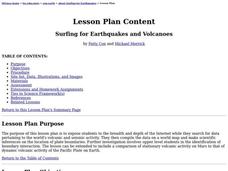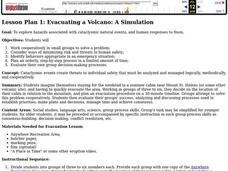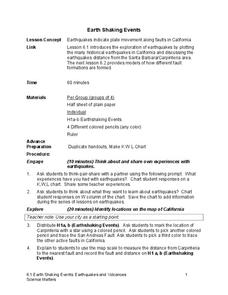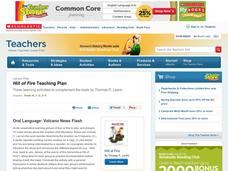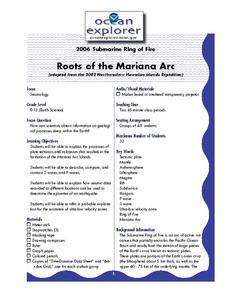Curated OER
Branches of Science Lesson Plans
Teachers can use branches of science lesson plans to get students excited about science careers.
Curated OER
Moon: NC Summer Tour Lesson 2007
Students investigate craters and marea. For this crater and marea lesson, students conduct an experiment to create craters. Students participate in a dance activity.
Curated OER
Surfing for Earthquakes and Volcanoes
Students search the Internet for data pertaining to the world's volcanic and seismic activity.
Curated OER
Evacuating a Volcano: A Simulation
Students explore hazards associated with cataclysmic natural events, and human responses to them by creating emergency plans.
Science Matters
Spaghetti Fault Model
Does increasing the pressure between two moving plates provide a stabilizing force or create more destruction? The hands-on lesson encourages exploration of strike-split fault models. The sixth lesson in a 20-part series asks...
Science Matters
Earth Shaking Events
The world's largest measured earthquake happened in 1960 in Chile, reaching a terrifying 9.5 magnitude on the Richter Scale. The second lesson plan in the 20-part series introduces earthquakes and fault lines. Scholars map where...
Curated OER
It's a Gas! Or is it?
Oceanography enthusiasts are given a series of thought experiments to consider in order to relate the solubility of gases and solids to underwater volcanoes. It is not particularly engaging to perform these thought experiments. Choose...
Scholastic
Hill of Fire Teaching Plan
Some books are perfect for drawing connections between multiple subjects. The book Hill of Fire becomes the hub for three very different, yet related activity ideas. First the class hones their oral language skills by creating an...
California Academy of Science
Earthquakes and Tectonic Plates
Here is a comprehensive package in which middle schoolers learn about types of seismic waves, triangulation, and tectonic plate boundaries. Complete vocabulary, colorful maps, and a worksheet are included via links on the webpage. You...
Science Matters
A Model of Plate Faults
The San Andreas fault is one of the longest fault zones in the world. In a series of 20 lessons, the fourth lesson has pupils use a paper model to recreate various types of plate faults. Each is held in position then drawn...
Science Matters
Finding the Epicenter
The epicenter is the point on the ground above the initial point of rupture. The 10th lesson in a series of 20 encourages scholars to learn to triangulate the epicenter of an earthquake based on the arrival times of p waves and s...
Science Matters
Earthquake Building/Shaking Contest
Japan is one of only a handful of countries that constructs buildings that are almost earthquake proof. The 13th lesson in the 20-part series challenges scholars to build structures to test against earthquakes. With limited materials and...
NOAA
Plate Tectonics II
Mid-ocean ridges, rift valleys, island arcs, mountain ranges, earthquakes, volcanoes ... there are so many features associated with plate tectonics. The 14th installment of a 23-part NOAA Enrichment in Marine sciences and Oceanography...
Curated OER
Roots of the Mariana Arc
Plumb the depths of the Submarine Ring of Fire and explore seismic waves with this lesson plan. Junior geologists simulate s-waves and p-waves, calculate their speeds, and then apply the data to discover the material that makes up inner...
Curated OER
Magic Tree House #13: Reading Questions
Reading comprehension questions for the 13th Magic Tree House book, Vacation Under the Volcano, are divided by chapter. Each chapter warrants three to five questions. They cover basic comprehension, vocabulary, and some inference.
Curated OER
Why Are Volcanoes Dangerous?
Students investigate the causes and characteristics of volcanic eruptions including pyroclastic eruptions. They study the effects of natural disasters.
Curated OER
A Site to See
Students identify the risks and benefits of living next to a volcano. After reading an article, they discuss the behaviors of an active volcano. Using the Internet, they work together to research volcano-monitoring techniques and create...
Curated OER
Explosive Geography
Students consider how volcanic eruptions can affect an environment and how a volcano works. The explosions of Mt. Saint Helen's, Mt. Redoubt, and Mt. Kilauea are researched and presented to the class in groups.
Curated OER
Earth Forces
Students use geological techniques such as plate tectonics, mountain building, earthquakes, and volcanoes, in order to explain the earth.
Curated OER
Volcanic IntEruptions
Seventh graders research about a devastating eruption of a certain volcano. In this earth science lesson, 7th graders discover the climate changes that occurred due to a volcanic eruption. They create a presentation about their findings...
Curated OER
Getting Fired Up
Students explore first-person accounts of volcanic eruptions throughout time and use second-hand information about volcanoes. They use both types of accounts to write news articles covering the events of a historic volcanic eruption as...
Curated OER
Too Hot to Handle
Students read an online article and research the ten most active volcanoes in the world. They devise an independent public service announcement for evacuating people living near a volcano.
Curated OER
Our Savage Planet in the News
Students research volcanoes, storms, atmospheric conditions and extreme environments. They collect information and create a simulation of a science newscast. They watch a video and write a letter as an eyewitness to an avalanche.
Curated OER
Hawaiian Hot Spots
Students discuss how plate tectonics and volcanic activity have affected Hawaii. In this Hawaiian instructional activity, students look at maps and photographs of Hawaiian Islands and discuss their formation through multiple volcanic...




